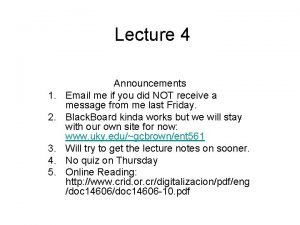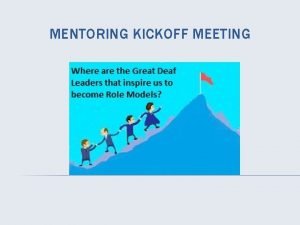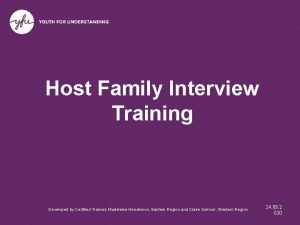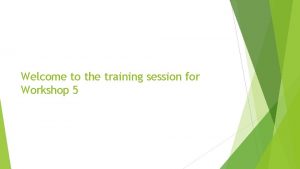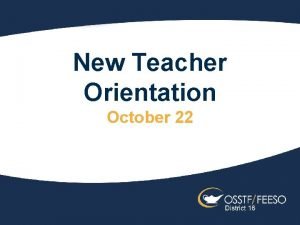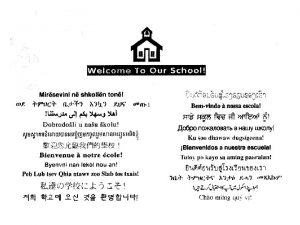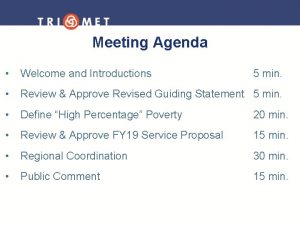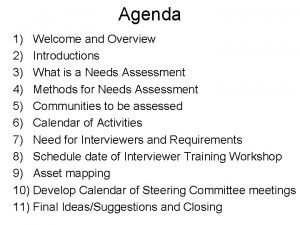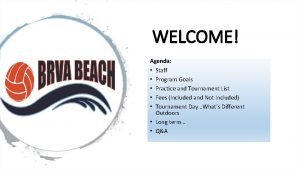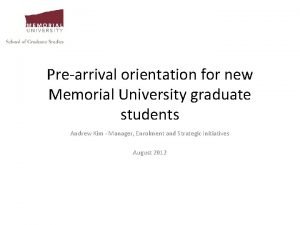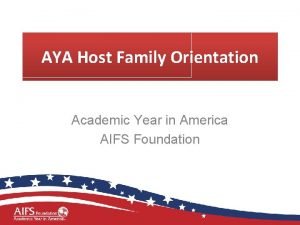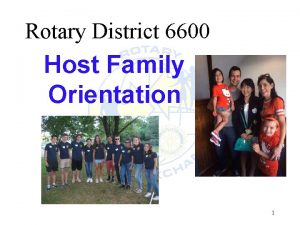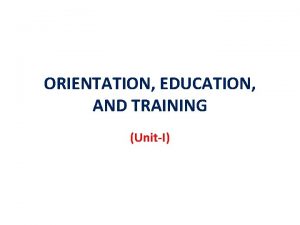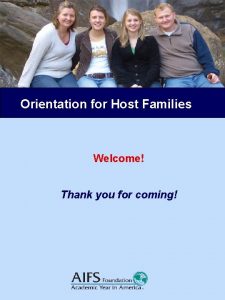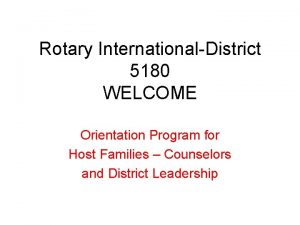Host Family PreArrival Orientation Welcome Agenda Session 1


































- Slides: 34

Host Family Pre-Arrival Orientation

Welcome!

Agenda: • Session #1: Welcome (10 minutes) • Session #2: You & YFU (60 -75 minutes) • Session #3: In Safe Hands (60 minutes) • Session #4: Cultural Awareness (35 -40 minutes) • Session #5: Adolescents & Family (20 minutes) • Session #6: Realistic Expectations (30 minutes)

What is YFU? YFU advances intercultural understanding, mutual respect and social responsibility through educational exchanges for youth, families and communities. https: //www. youtube. com/watch? v=H 356 jl Ok_bc&rel=0

Objectives: • Navigate your Host Family Account and identify important host family resources • Apply YFU policies and procedures that promote student and family safety throughout the student’s exchange • Identify challenges faced by adolescents and families in cross-cultural settings • Apply tips and best practices from other host families

You & YFU

Main responsibilities of hosting… 1. 2. 3. 4. 5. 6. Treat them as your own Help students achieve their goals Help students meet YFU expectations Provide Students with three meals a day Assist the students with transportation Provide a safe home with a bed and place to study

YFU Orientations

YFU Support & Area Representatives

Area Representatives and Additional Support: Area Representatives (AR) to serve to provide support and assistance to both the host family and the student. When support is needed contact your Area Representative or your Engagement Manager


www. yfuusa. org HOST FAMILY ACCOUNT/ RESOURCES TAB HOST FAMILY VIEW

Insurance Information • http: //www. yfuusa. org/international/insurance • All YFU students coming to the U. S. are required to carry insurance for the duration of their stay. 3 Types of Insurance Options for students: 1. Insurance provided by Dr. Walter 2. ASPE 3. Their own insurance through the YFU partner.

Educate students on Urgent Care Center vs. Emergency Room

Travel Policy Permission from National Office is required if student will: • Miss 5 or more days of school OR • Travel without host family for more than 3 nights OR • Pay more than $300. 00 OR • Travel outside the US

Dangerous Activities • Driving is prohibited • Check state laws on teens riding together • Several activities require special permission

In Safe Hands

Internet Statistics

Protecting YFU Communities • Avoid Misunderstandings • Recognize Warning Signs • Take Action

A Guide for Host Families on the Dangers Associated with Social Media The two main social media apps that have the most negative effects on the mental health of teens are Snapchat and Instagram. Having an up-to-date understanding of these apps will better ensure the safety and mental health of your student Snapchat Features: Snapchat stories, streaks, map & direct Snapchats Instagram Features: Instagram stories, feeds, filters & likes

Cultural Awareness

“Living in the foreign culture is like playing a game you’ve never played before when the rules haven’t been explained very well. The challenge is to enjoy the game without missing too many plays, learning the rules and developing skills as you go along. ” L. Robert Kohls

Iceberg Analogy CULTURAL AWARENESS

Japanese Dinner Out!

Dinner Out! Jim has decided to go out for an authentic Japanese dinner with Naoki, a Japanese exchange student at his college. Jim notices that Naoki slurps his soup loudly, despite Jim’s disapproving glances. During the meal Jim wants to avoid the embarrassment of having his hashi (chopsticks) roll off the edge of his plate or bowl so he decides to use the glutinous rice as a base and jabs them into the rice between bites. Soon Jim catches a surprised glance from Naoki. When the sake (rice wine) is brought to the table, Naoki quickly pours some only in Jim’s sake cup, leaving his own empty. Jim waits for Naoki to join him in drinking but it is quite some time before Naoki finally pours his own sake. At the end of the meal Naoki burps loudly and Jim seems quite distressed.

Adolescents & Family

Family Relationships

Reflecting on Your Family Dynamic • What do you need to take into consideration as your family prepares for a new family member? • What are some of the roles, responsibilities, relationships and rules that are now in balance, but may have to be reconsidered in order to accommodate a new family member? • How might culture and the iceberg analogy influence the kinds of adjustments your family will need to make? • Why are negotiation and compromise from both the student and host family important tools to be used throughout the exchange?

Tips for Hosting a Student • Have a conversation about family culture, rules, and expectations early on. • Keep the conversation lighthearted • Encourage the student to share common practices from their country with you • Be aware that weak language and exhaustion will make learning new routines and rules harder. • Treat the student as your own child. • Understand the student needs time to adjust. • Laugh “with” your student at mistakes and make it an opportune moment to correct behavior • Remember that these students are from another culture and are teenagers, so challenges are to be expected.

Realistic Expectations

True or False? • Our student will be just like the student profile that we read, and the student will match the picture we conjured up in our minds. • Our student will be perfect - more of an adult than a teenager. • Our student will be best friends with our own children. • Our student will fit right into our family.

True or False? • Our student and family will experience challenges together and will overcome these challenges together, and it will be worth it. • We will have challenges with our student, but once we overcome our first hurdle, it will be smooth sailing from there. • Our student will understand our family, our culture, and our community because we have exchanged emails. • Our student has excellent English skills in his/her emails! Our student will speak and understand English without any problems.

Key Points • You have already developed expectations, this is normal. • Your culture influences your expectations. • Stereotypes are common and based off of our own cultural perspective • Try to let go of expectations and think critically about stereotypes. • It is probably not going to be exactly what you expect, so it is helpful to try to go into the experience with …flexibility, patience, understanding and a positive attitude.

Additional Thoughts and/or Questions?
 Welcome session agenda
Welcome session agenda Definitive host vs intermediate host
Definitive host vs intermediate host Meeting agenda introduction
Meeting agenda introduction How to conduct a jad session
How to conduct a jad session Coaching session agenda
Coaching session agenda Host family applicant listening answer key
Host family applicant listening answer key Welcome to new session 2020-21
Welcome to new session 2020-21 Welcome to the training session
Welcome to the training session Welcome to today's session
Welcome to today's session Welcome to today's session
Welcome to today's session Agenda sistemica y agenda institucional
Agenda sistemica y agenda institucional New teacher orientation agenda
New teacher orientation agenda Agenda welcome and introductions
Agenda welcome and introductions High school freshman orientation agenda
High school freshman orientation agenda Ethnocentric and polycentric
Ethnocentric and polycentric Meeting agenda welcome and introductions
Meeting agenda welcome and introductions Meeting agenda welcome and introductions
Meeting agenda welcome and introductions Agenda welcome and introductions
Agenda welcome and introductions Meeting agenda welcome and introductions
Meeting agenda welcome and introductions Agenda welcome and introductions
Agenda welcome and introductions Agenda welcome
Agenda welcome Agenda welcome and introductions
Agenda welcome and introductions Meeting agenda welcome and introductions
Meeting agenda welcome and introductions Agenda welcome and introductions
Agenda welcome and introductions Welcome agenda
Welcome agenda Agenda welcome and introductions
Agenda welcome and introductions Agenda welcome and introductions
Agenda welcome and introductions Agenda welcome and introductions
Agenda welcome and introductions How to welcome parents in orientation
How to welcome parents in orientation Welcome to parent orientation
Welcome to parent orientation Welcome to parent orientation
Welcome to parent orientation Welcome speech for kindergarten parent orientation
Welcome speech for kindergarten parent orientation Welcome welcome this is our christmas story
Welcome welcome this is our christmas story Family of orientation
Family of orientation Group marriage example
Group marriage example

